- Bibliography | Chromatic Aberration Everywhere – As I tend to read a lot of more “academic” texts when it comes to studying anime, fandom, and interpretation, I thought it might be a good idea to throw up a list of all the things I’ve either read/seen so that anyone else interested in these types of ideas has a place to start.
- Japan’s Cute Army – The New Yorker – This stressful, ongoing debate fuels the seeming paradox of an “endearing” military force. In Japan, where indirect communication is highly valued, cute illustrations have long played the role of tension-breakers and mediators in situations of conflict. Thus kawaii mascots, whether miniskirted girls or bunny-rabbit decoy launchers, are both a reflection of pop-cultural trends and a way to defuse the very touchy issues surrounding the military’s undeniable presence.
- The Tyranny of Stuctureless – This means that to strive for a structureless group is as useful, and as deceptive, as to aim at an "objective" news story, "value-free" social science, or a "free" economy. A "laissez faire" group is about as realistic as a "laissez faire" society; the idea becomes a smokescreen for the strong or the lucky to establish unquestioned hegemony over others. This hegemony can be so easily established because the idea of "structurelessness" does not prevent the formation of informal structures, only formal ones. Similarly "laissez faire" philosophy did not prevent the economically powerful from establishing control over wages, prices, and distribution of goods; it only prevented the government from doing so. Thus structurelessness becomes a way of masking power
- A Piece Of Toast – YouTube –
- Otaku Philosophy | Public Seminar – Its origins are in cultural forms imported from the United States after the war. “The history of otaku culture is one of adaptation – of how to ‘domesticate’ American culture… Otaku may very well be heirs to Edo culture, but the two are by no means connected by a continuous line. Between the otaku and Japan lies the United States.”
Articles with the Tag manga
My Girl — Yumeka Sumomo
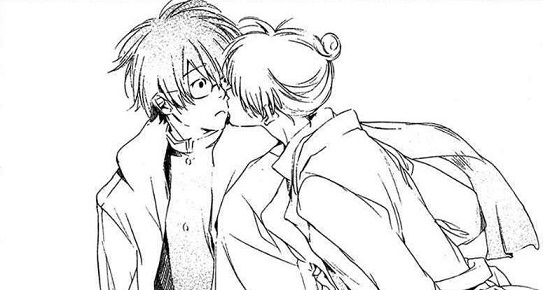
Somebody on the internets recommended My Girl as an underrated manga and from the description it sounded somewhat similar to Usagi Drop, which I’d marathoned a few weeks ago and wished I could’ve had more of. This however turned out to be slightly misleading, because while both stories are about young men just going with the flow suddenly coming into custody of five year old girls, the focus of both series is completely different. Usagi Drop is the story of becoming a parent, of learning to raise a child and overcoming all the every day challenges that come with it, while My Girl isn’t about that at all. Instead this is a story about grief and loss and coming to terms with it, of how this loss shapes and influences your daily life even as you struggle to overcome it and move on while remaining faithful to their memory. Needless to say this hit home for me.
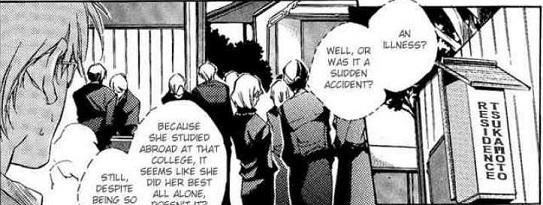
Here’s how the story starts. Kazama Masamune is a 23 year old salaryman stuck in a small town in the middle of nowhere, all because he promised Tsukamoto Youko, his high school love, he’d wait for her there if she ever decided to come back from her studies abroad. That was five years ago. And now he gets a phone call from Youko’s mother that’ll change his life. Youko has not only passed away, but it turns out the reason for her going abroad was that she was pregnant with his child… …and now he has Koharu, his five year old daughter to take care of, with both of them having to cope with each other’s grief over Youko’s death.
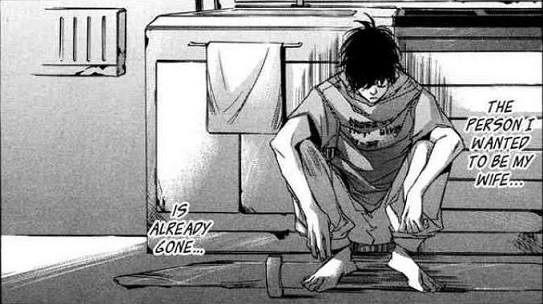
And it’s an understated, realistic sort of grief My Girl portrays, free from melodrama, the kind of sorrow that creeps up on you in the quiet hours, when you’re not distracted by work or school. I recognised a lot of myself in the ways in which both Masamune and Koharu dealt with their grief. No grand, dramatic gestures and atmospheric weather, just memories you come across in unguarded moments. I recognise the desire to keep up a front, to not burden friends or family with your sorrow or loneliness.
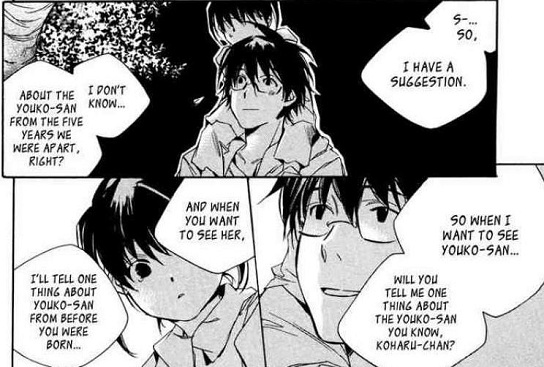
What saves is that they have each other to talk to, to share memories of Youko and discover her all over again. By sharing memories they can keep her alive a little bit, as each of them gets to see a new side of Youko through the stories of the other. All the while they’re also busy building a new life together, one that’s founded in their mutual love for Youko, which quickly transforms into love for each other. That transformation, of Masamume learning to be a father and Koharu learning to live with her father, is a delight to read about, a joyful counterpoint to the sorrow of Youko’s death.

This is also a story about forgetting and not wanting to forget, about letting go and moving on and what this means. From the start, even before he learns of her death, Masamume is exhorted to forget about Youko, to move on from what his family and friends/co-workers see as a childish high school infatuation, to stop waiting for somebody who will never come back to him. Objectively speaking, they’re right to do so. Youko was never going to come back, while he was living his whole life in thrall to his memories of her, in the process also losing sight of the real Youko. And while at first glance his devotion might be seen as romantic, it’s ultimately more cowardice than romance that keeps Masumume waiting for Youko. In a sense it’s only her death that legitimises his choice to wait, as it also finally enables him to start thinking about letting go of his dream.
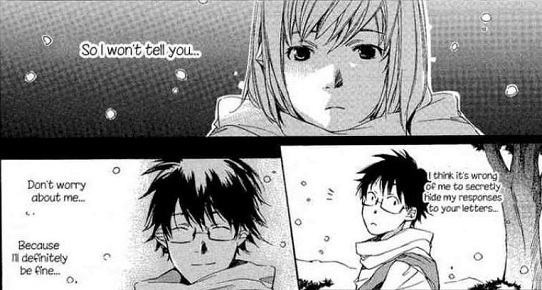
However, that doesn’t mean that this criticism is wholly justified. As he rediscovers Youko through his life with Koharu, as he struggles to deal with her death, it becomes clear he has kept on loving her all those years apart, even though he didn’t fully understand her or her motives. And as he attempst to move forward in the last part of the story, even starts dating a co-worker who had been in love with him even before Youko died, it’s obvious that he can’t move on from her that quickly.
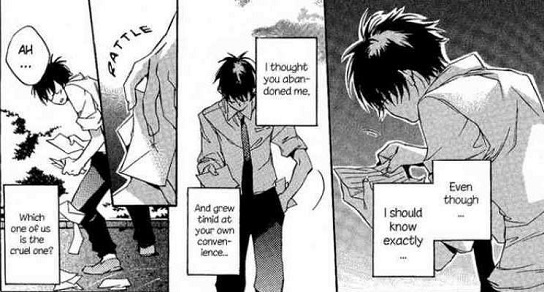
Reading My Girl is an exercise in melancholy, leaving behind an overwhelming sense of regret and what-if. I’ve never quite had an off-screen death of a character reach me so as it did here. Yumeka Sumomo manages to not just convey the grief and sadness of Youko’s death, but also the wasted opportunities for Youko, Masamume and Koharu to have shared their lives. I couldn’t help but wonder what might have been had Youko not ran away abroad, not gone for the noble self sacrifice, or if Masamume had been slightly more proactive rather than just kept passively waiting for her to come back. In a sense both of them chose safety, of not being hurt over the chance at happiness. By not telling him about her pregnancy Youko avoided being rejected by Masamume at the price of any possibility of a true relationship, while by being passive and neither seeking her out nor moving on, Masamume could avoid a similar rejection. Very understandable on both their parts, but damn if that doesn’t hurt to read.
Actually, I am a… (Jitsu wa Watashi wa)

Kuromine Asahi is a normal high school student with one big problem: he can neither lie nor keep a secret, something that amuses his friends greatly, though it does put a crimp in his social life, as those who do need to keep a secret avoid him. Worse, his complete inability to hide his feelings let him to be rejected by his crush “last summer” before he even had a chance to talk to her. But now he’s turning a new leaf, sure that he is able to hide his attraction to Shiragami Youko, a mysterious “cool beauty” he’s been admiring from afar, a girl distant from the rest of the class, always alone. His friends of course find out about his new crush in less than half a dozen of pages and challenge him to confess to her — better to confess and be rejected, than be shotdown before you even get the chance. With their encouragement he rushes over to talk to her, only to find out that she’s a vampire.
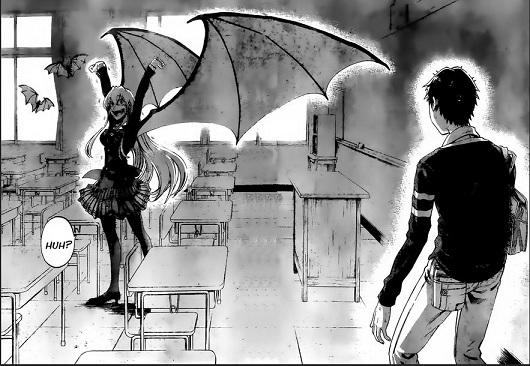
That in a nutshell is the central conceit in Jitsu wa Watashi wa (Actually, I am a…), with poor Kuromine now having a much greater secret to protect than any he has failed to keep so far. If anybody else finds out Shiragami’s secret, or that he knows her secret, her father will force her to quit high school. Meanwhile his discovery completely derailed his plans of confessing to her. His challenge now is to keep her secret and try and get closer to her, but things get complicated quickly, as they should in a harem comedy. And of course the first thing a harem comedy needs is some more love rivals, the first of which is Aizawa Nagisa, his class rep, not to mention the girl who shot him down before he could confess to her last summer. She has a secret too.
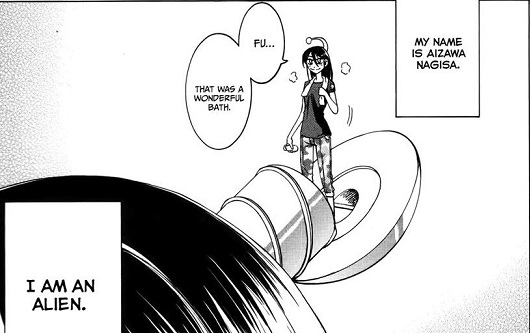
Aizawa’s a tiny alien steering a human size replica of herself (and for some reason she’s very good at coordinating her own outfits with her outer body’s) who has infiltrated Kuromine’s high school to observe Earth culture. As so often the case in this kind of story, it’s only now that Kuromine hs become friends with Shiragami that Aizawa becomes interested in him and starts wondering if she was too hasty to reject them. Cue a bunch of hilarious incidents in which mutual misunderstandings ultimately lead to Kuromine/Shiragami and Aizawa learning each other’s secrets. But that’s only the start. Before long there’s not only the obligatory childhood friend & tormentor of Kuromine, but other strange creatures showing up at the school as well, including Shiragami’s childhood friend, the wolfman. And that brings me to what I like the most about this series, its sense of humour. Because how would you test that the scary looking dude that interrupted your date with Shiragami is indeed that childhood friend? Like so:
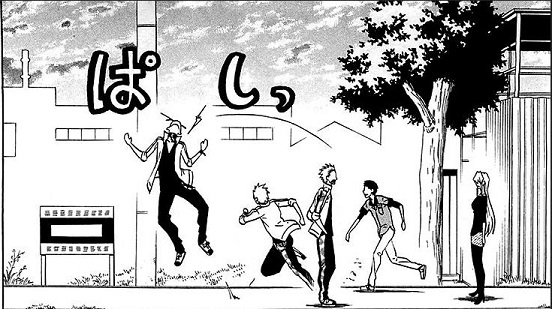
This is a comic that thrives on stupidity, both of plot and characters; not for nought it’s “welcome to the world of idiots” as shown above. Kuromine might have been introduced as the idiot who can’t keep secrets or tell lies, but it soon turns out he really is the straight man in a menagerie of idiots. Before long you wonder how Shiragami was ever able to keep her secret on your own, or how the class rep ever got around without his help, not to mention Shiragami’s father, not the brightest tool in the shed either, showing up to sports’ day as a giant bat holding a video camera… The author, Masuda Eiji, has a knack for writing comedy coming from the characters themselves as for developing over the top, contrived situations, often set in motion by the demon principal and principal troll. There’s a lot of slapstick comedy, but perhaps the best part is the way Masuda draws reactions. His faces are elongated, elastic and great at showing exaggerated emotions:
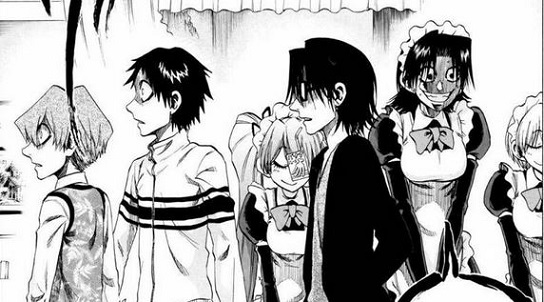
Aren’t those great faces? That fixed grin on the maid in the background, the surprise on the three walking past her, the series is full of moments like that, where you have to just laugh out loud at the absurdity of it all. but there’s more to this series than just comedy, though it never remains serious for long. Unlike some harem series, Jitsu wa Watashi wa is clear about the fact that Kuromine loves Shiragami, that she ultimately loves him back and does actually make progress in their relationship, even though both are less than honest or brave in their emotions at the start. And it manages to do so without devaluing the other two love interests, the class rep and childhood friend, whose love may go unreciprocated but is still real, without throwing more girls at the main character, with more people showing up to add to the hilarity, but not to the harem and without making the girls each other enemies. Shiragami and Aizawa especially are friends and remain friends despite being love rivals. That’s what makes this series so much fun to read.
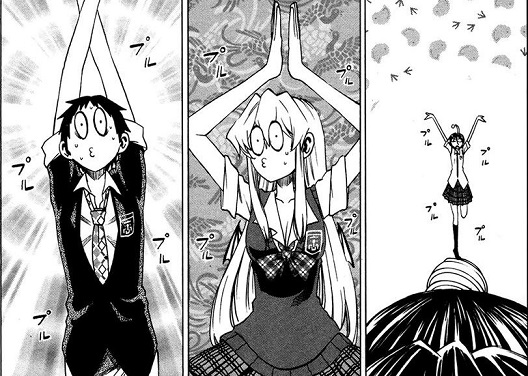
Sadly though it’s not yet legally available in English, though a first volume is slated to be published in 2016. if you’re not bothered overly much by legal niceties, scanlations are available. You may want to switch on the in comic comments as well, because this is a series that benefits from reader snark…
Your Happening World (July 21st through September 7th)
- What Japanese Girls Do With Manga, and Why – What follows, then, is not an objective analysis formulated by a scholar who stands apart from and above the "phenomenon," but is rather an analysis by a person who is himself an avid reader of the genre, yet who nonetheless tries to examine the genre and its readers critically and from multiple angles, not only for the purpose of telling you what "they" do, but to contribute a transnational perspective to an ongoing discussion of what we do as participants in popular culture.
- Manga List, Read Manga Online at MangaHere.co –
- Rakudai Kishi no Eiyuutan 1 – Read Rakudai Kishi no Eiyuutan Chapter 1 Online – Page 1 –
- Page 1 :: The World God Only Knows :: Chapter 1 :: Red Hawk Reader –
- Batman: The Animated Series script bible –
Your Happening World (July 10th through July 13th)
- welcome to overvalwagen.com –
- Review: ‘Unexpected Stories,’ By Octavia Butler : NPR – At some point during the excavation, two short stories emerged: "A Necessary Being" and "Childfinder." Both written in the '70s, one was apparently left unpublished by Butler herself, the other part of a famously unreleased anthology. Both are finally seeing the light of day in an e-book called Unexpected Stories.
- Orientation Police — The Nib — Medium – I’m gay. I date men. Some of those men have vaginas.
- Trigger Warning: Breakfast — The Nib — Medium – The next morning, I make him breakfast. If I didn't say no, it's just a romance
- The Line it is Drawn #183 – Western Re-Designs of Manga/Anime Characters | Comics Should Be Good! @ Comic Book ResourcesComics Should Be Good! @ Comic Book Resources –